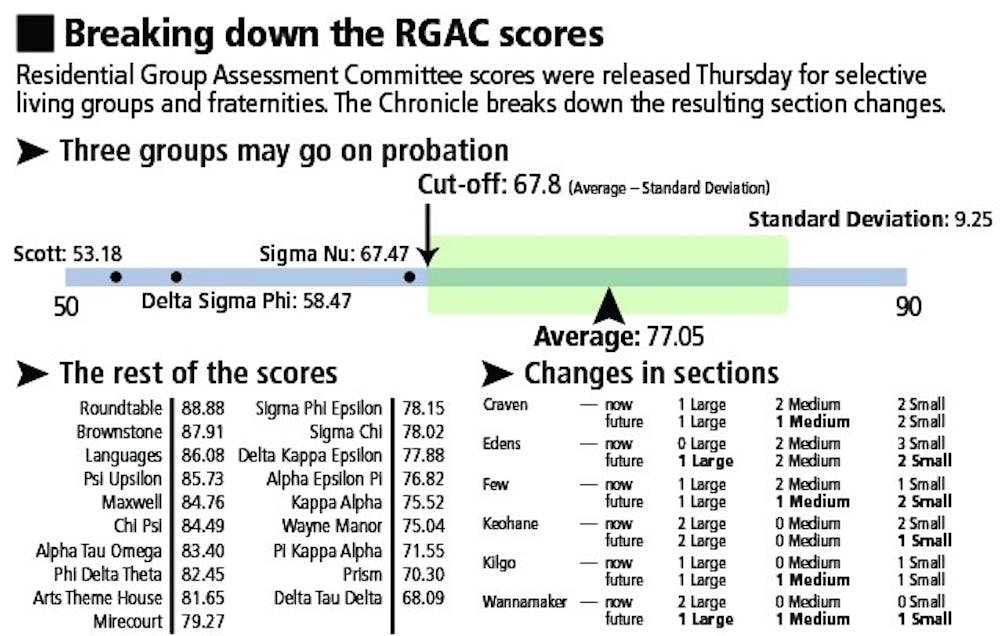Selective living groups, including fraternities, will be choosing new sections next week, after Campus Council determined a new slate of available sections Thursday.
The release of a new set of sections comes at the end of the three-year residential group assessment process, designed to evaluate the impacts of selective living groups on campus.
“Tonight was the culmination of a whole lot of work, both on the part of Campus Council and on the part of [Residence Life and Housing Services],” said Campus Council President Stephen Temple, a junior.
In the assessment process, groups were divided into three groups based on membership and evaluated yearly in categories such as section management and membership experience. (Please refer to the documents available under "Related FIles" to the right of this page.) Campus Council released scores from the final round of the process Thursday night.
Groups scoring higher than the average score in their size categories have the ability to remain in their current sections—they must choose whether they will do so by Monday night. After eligible groups have chosen whether to squat, all groups not remaining in their current locations will choose their new homes on the basis of how they scored within their size categories.
At its Thursday night meeting, Campus Council chose the set of sections that will be available to groups from a pair of options for the arrangement of sections across West Campus. The two slates of sections were prepared by Campus Council members and RLHS staff.
The slates were designed to distribute selective living groups more evenly across quads, limit the number of groups placed near each other in individual buildings and avoid placing small clumps of independent students near groups, Temple said.
No new groups will be given housing and no groups will lose their housing as a result of the process.
Jen Frank, assistant director of accommodations for RLHS, said fewer sections will have dedicated common rooms.
Some sections that groups currently live in have been altered or eliminated.
In the chosen slate, one of Wannamaker Quadrangle’s two large sections has been removed—a small group section is now available on the building’s second floor and a medium section is available on its third and fourth floors. Craven Quadrangle will now hold four groups, down from five—a medium section was eliminated.
A small section in Edens Quadrangle has been replaced with a large section, increasing the number of selective living group members who will live in that quad.
“I think that the result that we ended up with at the end of the day is the best one we could have chosen,” Temple said, adding that the new sections will be beneficial for both independent and affiliated students.
Some selective living groups may receive warnings for receiving low scores on the assessment process. Campus Council passed a resolution Thursday stating that groups with overall scores lower than one standard deviation below the mean will be placed on probation.
According to the resolution, groups may also be placed on probation for receiving a score lower than one standard deviation below the mean in the assessment’s fundamental categories—section management, group conduct, quad interaction and membership experience—or if the group’s section management and group conduct scores combined are lower than one standard deviation below average.
“This is essentially a warning,” Temple said. “You need to get it together or you risk having your section taken away.”
Groups will be told they need to improve in specific areas and will be given a year to make changes before reporting back to Campus Council, Temple said. It is unclear what progress groups need to make in order to avoid losing their housing.
Campus Council will release a list of groups on probation today, after informing the groups’ leaders. According to scores released Thursday night, Sigma Nu fraternity, Delta Sigma Phi fraternity and Scott House will be among the groups placed on probation.
In other business:
Bob Johnson, senior director of communications infrastructure for the Office of Information Technology, said the University is working to improve cell phone service across campus. Duke will add additional cellular nodes by the end of the month to West Campus. No plans were made to improve cell service on Central Campus because Duke intended to renovate it. Now that plans for New Campus have been postponed indefinitely, “we’re going back to see what we can do about that,” Johnson said.
Get The Chronicle straight to your inbox
Signup for our weekly newsletter. Cancel at any time.

